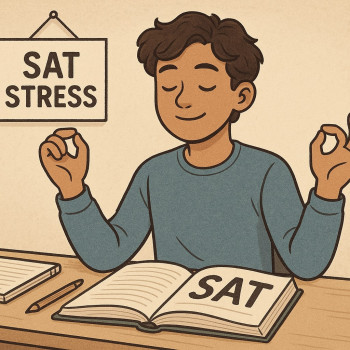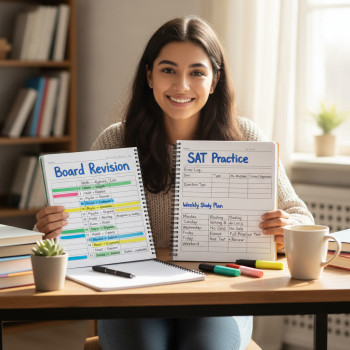When SAT Season Feels Loud: Why Listening Matters
For many families, SAT season brings a hum of calendars, practice tests, and quiet evenings lit by laptop screens. But beneath the schedules and scores there’s often something quieter — and more important — that teens need: to be heard. Listening well isn’t just soft support. It’s one of the most powerful tools parents have to help their teen manage test anxiety, stay motivated, and make thoughtful choices about college. The College Board encourages parents to be involved and informed in the planning process, and that involvement is most constructive when it starts with listening to the student’s experience and feelings. ([bigfuture.collegeboard.org]( Idea : A candid, warm photograph of a parent and teen sitting across a kitchen table, a practice SAT page and a mug of tea between them — the teen mid-sentence, the parent leaning in, showing open body language.
Why teens might not always tell you everything
Teens often mask worry with humor, distraction, or withdrawal. They may fear disappointing you, or they might think stress is a private problem to be solved alone. Sometimes they’re unsure what they’re worried about — is it the score, the timing, the college choices, or a larger fear about the future? Your job as a listening parent is to create the space where those pieces can come into view, without judgment.
Simple Listening Habits That Make a Big Difference
Good listening is less about having the right answer and more about giving the right attention. Here are practical habits parents can adopt right away.
- Be present, not just physically: Put away the phone, close the laptop, and schedule short check-ins. Teens notice when your attention is genuine.
- Begin with curiosity: Ask open questions (“What part of SAT prep is hardest for you?”) rather than yes/no prompts.
- Reflect back what you hear: Simple reflections — “It sounds like the timing makes you nervous” — validate feelings and invite more detail.
- Pause before fixing: Resist jumping to advice. Offer help only after you’ve heard their full concern.
- Normalize the emotion: Let them know stress is common and manageable; share a brief story of a time you felt anxious and what helped.
Words that Help (and Words That Don’t)
Language shapes how a teen experiences their stress. Use phrases that open dialogue and lower pressure, and avoid platitudes that can feel dismissive.
- Try: “Tell me more about that.”
- Try: “What part of prep feels doable?”
- Avoid: “Don’t worry, you’ll be fine.” (This can minimize their feeling.)
- Avoid: “You need to study more.” (This can feel like blame before you know the situation.)
When to Ask Questions — and Which Ones Work
Questions are tools. The most useful ones are specific, nonjudgmental, and actionable. Here are examples that guide a productive conversation.
- “Which section of the Digital SAT feels hardest right now — Reading, Writing, or Math?”
- “When you did a practice test, what part made you stop or lose time?”
- “If you could change one thing about your prep schedule, what would it be?”
- “Would you like me to help you plan a practice block, or would you prefer a quiet space to focus?”
Concrete Ways Parents Can Help After Listening
Once a teen has had a chance to speak and feel heard, parents can move into constructive support. The steps below keep the teen in the driver’s seat while offering structure.
- Co-create a realistic study plan: Short, focused practice sessions beat marathon cramming. Aim for consistency — 30–50 minutes with breaks depending on focus.
- Offer logistic help: Schedule practice test days, arrange quiet space, or cook a stress-free dinner on test nights.
- Encourage active rest: Sleep, short walks, and breaks between study blocks improve retention and reduce anxiety.
- Celebrate process wins: Praise study habits and dedication, not only test scores.
How parents can use practice tests supportively
Practice tests are useful when they illuminate learning needs rather than become score-obsessions. Review practice results together calmly: find one clear strength, one manageable weakness, and a tiny experiment to try next time.
Table: A Simple Listening-to-Action Roadmap
| Step | What the Parent Does | Expected Outcome |
|---|---|---|
| 1. Create the space | Schedule a short, device-free check-in; use open questions | Teen feels safe to share specifics |
| 2. Listen and reflect | Mirror feelings; avoid advice-first responses | Teen clarifies worries and priorities |
| 3. Co-plan small steps | Agree on 1–2 small actions: practice block, rest plan | Stress becomes actionable and less vague |
| 4. Check back | Follow up, celebrate effort, adjust plans | Improved habits and trust; anxiety decreases |
Dealing with High Anxiety: When Listening Isn’t Enough
Sometimes stress is more than normal pre-test nerves. If a teen’s sleep, appetite, schoolwork, or daily life are seriously affected, or if panic and avoidance are persistent, it’s time for extra support. School counselors can help bridge the gap, and professionals can provide tools for coping with anxiety. The College Board and BigFuture resources highlight the range of supports available for families navigating the testing process. ([satsuite.collegeboard.org]( to talk about getting extra help
Bring it up gently: “I notice you’ve been really tired and overwhelmed. Would you want to talk to our school counselor together?” Framing help as teamwork reduces stigma and keeps the teen involved in decisions.
Using Technology and Tools Without Losing the Conversation
Digital SATs, online practice platforms, and mobile apps offer tremendous benefits: realistic test simulations, instant scoring, and targeted practice. But technology is most effective when it complements — not replaces — human support. Review practice results with your teen instead of letting an algorithm’s score be the final verdict. College Board’s BigFuture and the SAT Suite resources offer parent guides and tools that can help parents stay informed and involved while respecting teens’ autonomy. ([bigfuture.collegeboard.org]( Idea : A screenshot-style staged photo showing a parent and teen reviewing a practice test results screen together on a tablet, pointing to one highlighted problem to discuss improvement strategies.
When structured tutoring helps
Personalized tutoring blends expert instruction with emotional support. For some teens, a trusted tutor can turn frustration into confidence by breaking concepts into bite-sized skills and providing immediate strategies for improvement. If your teen reacts defensively to parental help, a neutral tutor or coach may be more effective. Programs like Sparkl — which offer 1-on-1 guidance, tailored study plans, expert tutors, and AI-driven insights — can be a good fit for families who want both academic scaffolding and motivational support. Mention that tutoring is a partnership: you remain involved as the cheerleader, organizer, and listener.
Practical Scripts: What to Say (and How to Say It)
Here are short, ready-to-use scripts parents can adapt. They’re designed to validate feelings and invite collaboration.
- “I can tell this has been stressful. Do you want to talk about what feels hardest right now, or would you rather I listen while you get it off your chest?”
- “I’m proud of how hard you’re working. Let’s look at one small thing we can do this week to make practice feel less overwhelming.”
- “If you’d like, I can help find a quiet spot and bring snacks for your next practice test. Or I can back off—what would be most useful?”
- “It’s okay to be nervous. What have you tried that helped even a little before?”
The Parent Checklist: Daily and Weekly Habits
Consistency gives teens stability. Here’s a short checklist parents can use to stay supportive without micromanaging.
- Daily: One 10–20 minute check-in (listening, not lecturing).
- Weekly: Review one practice test together and set a tiny goal for the next week.
- Biweekly: Reassess the study schedule to keep it realistic and balanced.
- As needed: Arrange a meeting with the school counselor or consider a personalized tutor.
Real-World Example: From Panic to Plan
Emma, a high school junior, began losing sleep during a period of intense SAT practice. Her parent noticed she was irritable and skipping meals. Instead of pushing more hours, they asked open-ended questions and learned she felt overwhelmed by timing questions. Together they set a small experiment: two timed 25-minute practice blocks a week, followed by 30 minutes of review with focused strategies for pacing. They scheduled a weekly check-in where Emma spoke about what went well and what to tweak. Over six weeks she improved time management and regained sleep. The parent’s listening — not lecturing — made all the difference.
Balancing Expectations: College is More Than a Test
Remember: admissions decisions rest on many pillars — coursework, activities, essays, recommendations, and fit. Scores are one piece, not the whole story. Reinforcing a broader perspective helps teens invest energy in areas that matter most to their goals and values. College Board resources encourage families to explore the full landscape of college planning, and staying involved through tools like BigFuture can help parents and students navigate options together. ([bigfuture.collegeboard.org]( resiliency and perspective
Teach teens to treat setbacks as data, not verdicts. A lower-than-expected practice score reveals a learning target; it doesn’t define their worth or their future. Framing practice as information to use — not a final judgment — reduces fear and invites curiosity.
Final Thoughts: Listening as an Act of Love and Strategy
At the heart of SAT season is a teen learning how to stand up to challenges. When parents listen well, they do more than soothe nerves — they help teens build skills that last: self-awareness, planning, and resilience. Practice presence, ask curious questions, reflect back, and move slowly from listening to co-planning. When academic or emotional hurdles exceed what you can handle alone, bring in trusted professionals — school counselors or personalized tutoring supports like Sparkl — who can provide targeted help without replacing the unique role you play as a supportive listener.
Your teen doesn’t need a perfect parent; they need a parent who shows up, listens, and helps turn worry into workable steps. That steady presence is a quiet, powerful advantage on the path to college and beyond.
Quick Resource Reminders
- Look for parent guides and planning tools in the BigFuture resources to stay informed about timelines and supports. ([bigfuture.collegeboard.org](
- If practice tests reveal clear skill gaps, consider structured 1-on-1 tutoring that offers individualized plans and accountability.
- When stress affects daily life or mental health, reach out to school counselors or healthcare professionals for support.
Listening well is a simple skill with profound consequences. Start small, stay consistent, and let your teen know you’re on their team — not just as a logistics manager for test day, but as the steady person who helps them make sense of the journey.













No Comments
Leave a comment Cancel